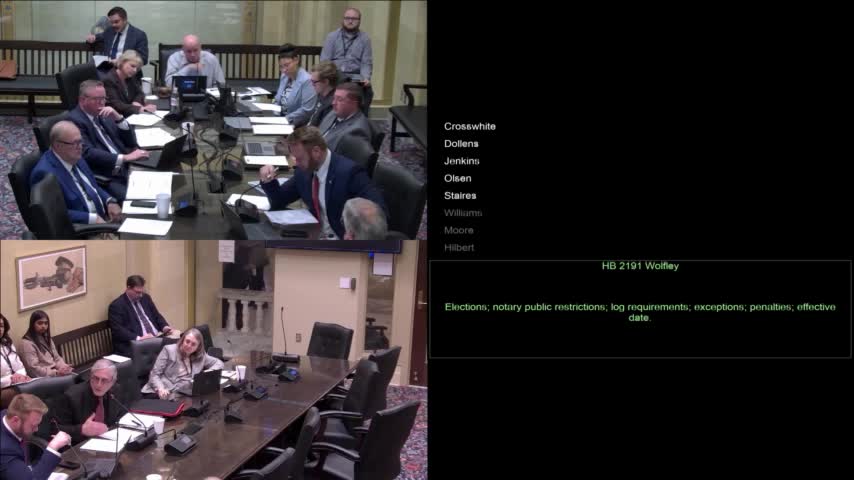Committee approves bill requiring voters to give reason when applying for absentee ballot
Get AI-powered insights, summaries, and transcripts
Subscribe
Summary
The House Elections Committee approved a committee substitute for House Bill 1515 that would require registered voters applying for absentee ballots to indicate a reason on the application; the measure passed the committee 4–3 after members debated privacy, recordkeeping and the stated goal of “strengthening integrity.”
The House Elections Committee on an unspecified date approved a committee substitute for House Bill 1515 that would require registered voters who apply for absentee ballots to indicate, on the application, the reason they cannot vote in person.
Proponents said the change would strengthen election integrity; opponents called the requirement intrusive and unnecessary. Representative Jenkins, who presented the committee substitute, said the form would require applicants to check a box indicating why they cannot vote in person either on election day or during early in-person absentee voting. Jenkins said the change was “one more measure to strengthen the integrity of voting.”
The bill drew repeated questions from committee members about both the evidence for absentee fraud and how the new application would work in practice. Representative Collins asked Jenkins to cite any example of absentee fraud in Oklahoma; Jenkins said he could not cite a specific example from last year but said the bill is intended to prevent such situations. Representative Collins and others pressed whether asking a voter to state a reason is inconsistent with other constitutional rights; Jenkins replied that the requirement would be minimal — “all they have to do is check a box” — and not a request for permission.
Paul Zierox, identified in the hearing as the State Election Board secretary, described how absentee applications currently work and how the proposed form would fit into election records. Zierox said the standard absentee application options (uniformed services, physically incapacitated and others) already exist and that an applicant can apply for a single election or for the entire year under current processes. He told the committee that absentee ballot applications are a matter of public record, that identifying information such as a driver’s license number or the last four of a Social Security number would be redacted for public requests, and that election records are kept for roughly 24 months after an election date.
Committee members also asked what would be done with the list of stated reasons. Jenkins said no one would be denied a ballot for selecting a reason; the requirement is to state a reason on the form. Zierox said such applications would be retained as part of periodic election audits because absentee applications are public records.
Members questioned whether the bill’s purpose was to discourage absentee voting; Representative Stairs asked whether that was the intent. Jenkins replied the stated goal was to “strengthen the integrity of the election” and suggested making applicants “give pause” before using absentee ballots. Jenkins also cited three other states he said require a reason — Texas, Tennessee and Indiana — as rough comparisons.
Concerns raised by committee members included whether the form would require voters to reapply for each election if their circumstances changed and whether having boxes for “illness” or “religion” is intrusive. Jenkins said the bill would not require a voter to specify which religion they practice; a voter would simply check the religion box if applicable.
After questions and brief debate, the committee recorded a 4–3 vote in favor of the committee substitute and the chairman declared the bill passed out of committee.
Votes at a glance: committee recorded the measure 4 aye, 3 nay; mover/second not specified in the hearing record.
Because the hearing transcript contained differing descriptions of some operational details — for example, committee members read parts of the draft as limiting an application to a single election while the State Election Board secretary described the current system as allowing single-election or year-long applications — the committee record shows discussion but not a single definitive procedural answer in the hearing itself.
The committee adopted the PCS as a working draft and forwarded the bill with a favorable recommendation.
